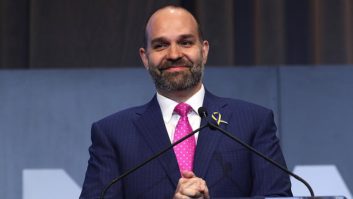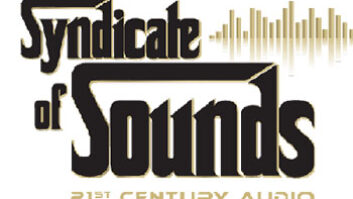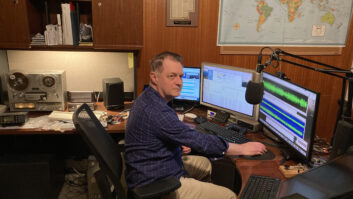Rep. Darrell Issa, R-Calif., did not equivocate about his support for copyright reform at a press conference and lobbying event Wednesday in Washington. “Free is no longer acceptable,” Issa said as the question of what radio stations and others pay musical performers returned to Capitol Hill.
Speaking as both chairman of the House Judiciary Committee’s Subcommittee on Courts, Intellectual Property, and the Internet and as a former Consumer Electronics Association chairman, Issa said his view is that H.R. 1733 — aka the Fair Pay Fair Play Act — must be a part of any copyright reform enacted in the future. The bill, introduced in April 2015, is but the most recent legislative effort by the recording industry, many artists and their Hill supporters in a long-drawn fight with broadcasters.
Issa believes musicFirst and other advocates have succeeded in building awareness but said there was much work to be done. He said existing law was not wrong when enacted, but “today stations take full advantage of a legacy law that they profit from, but then tell [the recording industry] that their business model doesn’t work if they have to pay [artists].” He said he recognizes that most broadcasters purchased their stations with the expectation that they would not have to pay to play artists for certain music. Nonetheless, he said, they bought “50,000 watts of something” — and that something, Issa says, often is music written and performed by artists.
Rep. John Conyers, the dean of the House of Representatives, representing Michigan’s 13th district — including Detroit and by extension Motown — was present. He called for Congress to work to “harmonize and modernize outdated legislation” that prevents artists from being fairly compensated, saying Martin Luther King Jr. would have viewed this issue as one of civil rights.
The event featured musical star power in addition to the politicians; and a number of related performance rights issues were mentioned.
Singer/songwriter Roseanne Cash noted that the pre-1972 recordings from so-called legacy artists should be viewed sympathetically by young up-and-comers. After all, she said, “all of us will one day become legacy artists, well, if we’re so lucky.” Singer-songwriter-producer T Bone Burnett spoke to rights issues not just on U.S. stations but also on the internet. He bemoaned mistreatment by “digital entrepreneurs,” especially YouTube, and the poor sound quality he said they promote. “A music economy that works is what’s at stake,” Burnett said, greeted with applause. In December, Burnett wrote an editorial on this subject that ran in the Washington Post.
Blues Brother Tom “Bones” Malone emphasized benefits of signing a reciprocal trade agreement with the European Union, which he said would allow U.S. artists to receive fair pay for airplay more akin to European musicians, he said. Dave Pomeroy, singer and president of the Nashville, Tenn., chapter of the American Federation of Musicians, echoed Malone. He said European performance rights were nothing short of a “balance of trade issue that should be held in our favor.” If amended, Pomeroy said, such a deal would help the whole of the American economy. He finished by saying, “It’s not too late to show Aretha and all those other [legacy] musicians some respect.”
After the press conference, some 40 musicians went on to visit about 30 congressional offices, pleading the cause they labeled #FairPlayFairPay.
Meanwhile, the National Association of Broadcasters sounded unfazed. “We’re pleased that 250 members of Congress have chosen to stand by hometown radio stations against the giant recording labels,” said NAB Executive Vice President of Media Relations Dennis Wharton. “We value our relationship with musicians. Everyday hometown radio stations are sustaining legacy artists and launching the careers of new artists. By contrast, many artists are suing their recording labels for royalties that they are owed. We believe radio stations are the best friend of the artists.”
NAB this week took out three days of advertising in major Hill publications, thanking co-sponsors of the Local Radio Freedom Act.












